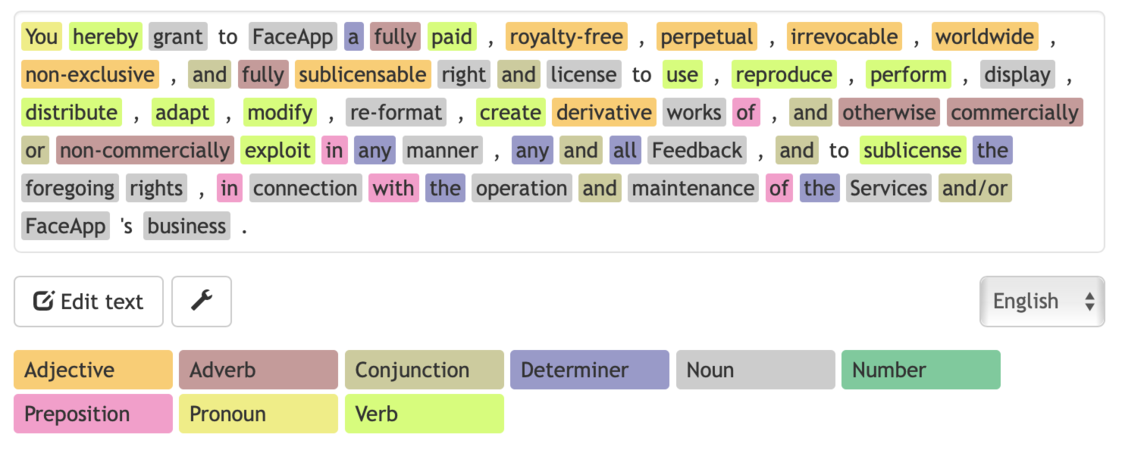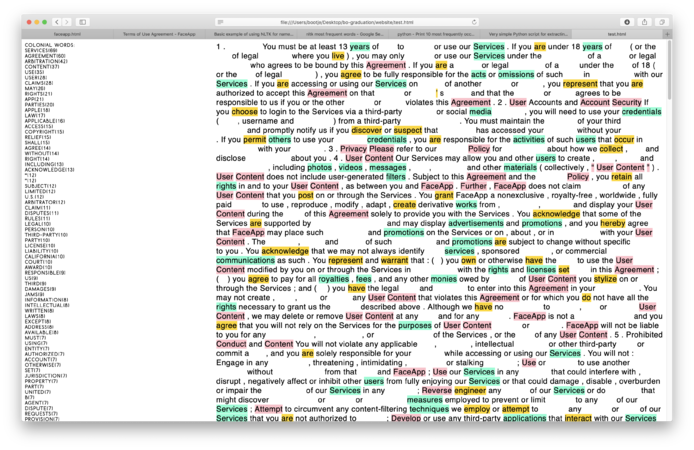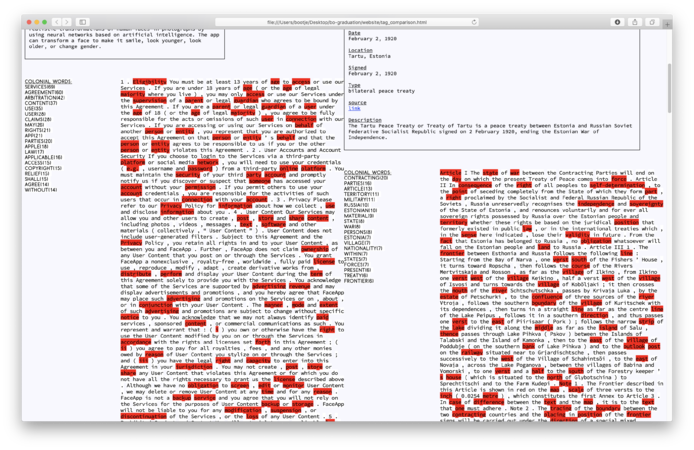User:Bohye Woo/Degrees of coloniality in Terms of Service: Difference between revisions
| Line 25: | Line 25: | ||
* <b>Language as a colonial language</b>: using a language that you're porting into the colony in order to be able to extract the resources. (ex, Japanese forced Korean to speak Japanese) | * <b>Language as a colonial language</b>: using a language that you're porting into the colony in order to be able to extract the resources. (ex, Japanese forced Korean to speak Japanese) | ||
=A list of Terms of Services= | |||
These companies are officially not a colony, but in a pratical term: a colony. There is a relationship that is unfair regardless what their intention is. <br><br> | |||
PokemonGo: https://www.pokemon.com/us/privacy-notice/ <br> | |||
TikTok: https://www.tiktok.com/legal/privacy-policy?lang=cn#privacy-row <br> | |||
Snapchat: https://www.snap.com/en-GB/privacy/privacy-policy/ / https://www.snap.com/en-GB/terms/ <br> | |||
FaceApp: https://www.faceapp.com/privacy-en.html / https://www.faceapp.com/terms-en.html <br> | |||
Netflix: https://help.netflix.com/legal/termsofuse / https://help.netflix.com/legal/privacy <br> | |||
Amazon: https://www.amazon.com/gp/help/customer/display.html?ie=UTF8&nodeId=468496&ref_=footer_privacy / https://www.amazon.com/gp/help/customer/display.html?ie=UTF8&nodeId=508088&ref_=footer_cou <br> | |||
Sony - Aibo: https://us.aibo.com/terms/aibo-privacy.html <br> | |||
FaceBook <br> | |||
Instagram <br> | |||
=Process= | =Process= | ||
Revision as of 15:05, 26 April 2020
(title yet decided) — general description
I'm building a modern-colonial text publishing archive, a series of word analysis that reveals the modern-colonial contexts in 'Terms of Service (ToS)'. ToS is a modern working contract in digital colonial society, where big companies are dominating the power structures via ToS to deceive users. My project introduces how modern digital colonialism is showing in digital society by mapping out the whole architecture of language in ToS.
The role of my project
The role is to...
- contribute a platform of reading ToS. In doing so, it questions what does it mean to provide ToS in the digital corporate society.
- question the concept of digital colonialism by providing visualization of ToS language as a modern-colonial tool to deceive users.
- analyse ToS from major tech companies to investigate how particular terms are being used in the specific context of ToS. Because ToS platforms have different tones of voice, different words being used. How does the platforms have modern-colonial aspects in ToS?
- examine what is modern-colonial language by taking a closer look on words within the realm of ToS. This provides categorization of modern-colonial language into digital colonial glossary.
- archive. It is evident that not much of digital material will survive (Zelkowitz, 2003). Archiving is important in digital age as a preservation tool because of perpetual changes in digital platform. My project archives related informations about digital colonialism including news articles, videos, books, tweets ... to proffer knowledges I gleaned from the web. The archive will contain different analyzations on the modern-colonial words and contexts.
(Zelkowitz, 2003): Advances in Computers: Information Repositoriesedited by Marvin Zelkowitz: https://books.google.nl/books?hl=en&lr=&id=xqvv7yqtr2kC&oi=fnd&pg=PA1&dq=importance+of+knowledge+archiving&ots=9NU6J-zv88&sig=2pkfx30iXkDgFS4-wLsqT9iVs8Y#v=onepage&q=importance%20of%20knowledge%20archiving&f=false)
Important aspects
As a contract aspect:
- Lots of treaties were sneakily made in colonial era to be lucrative, to get profit out of their colony. Same goes for the ToS or privacy policies in digital corporate society where the big companies are dominating the power structures via ToS to deceive users
As a language/linguistic aspect:
- Language as a colonial tool: Treaties in colonial times and Terms of Service in modern time both are to control the power structure. it shows a way to indoctrinate/manipulate the colonize subject by language.
- Polarity of calming language: How specific words can play as colonial words? Using their comfort language become a colonial language. Comforting language for the company that are using highly polarized terms sometimes obfuscates or conceal users labour to deceive them.
- Language as a colonial waterway: Shiproute in colonial times that used to sail to exchange goods, extract sources, and import labours. Language itself as a medium by which to interface with the colonizer.
- Language as a colonial language: using a language that you're porting into the colony in order to be able to extract the resources. (ex, Japanese forced Korean to speak Japanese)
A list of Terms of Services
These companies are officially not a colony, but in a pratical term: a colony. There is a relationship that is unfair regardless what their intention is.
PokemonGo: https://www.pokemon.com/us/privacy-notice/
TikTok: https://www.tiktok.com/legal/privacy-policy?lang=cn#privacy-row
Snapchat: https://www.snap.com/en-GB/privacy/privacy-policy/ / https://www.snap.com/en-GB/terms/
FaceApp: https://www.faceapp.com/privacy-en.html / https://www.faceapp.com/terms-en.html
Netflix: https://help.netflix.com/legal/termsofuse / https://help.netflix.com/legal/privacy
Amazon: https://www.amazon.com/gp/help/customer/display.html?ie=UTF8&nodeId=468496&ref_=footer_privacy / https://www.amazon.com/gp/help/customer/display.html?ie=UTF8&nodeId=508088&ref_=footer_cou
Sony - Aibo: https://us.aibo.com/terms/aibo-privacy.html
FaceBook
Instagram
Process
Tools
1. NLTK will help to analyse and categorise the words from ToS.
- NLTK website http://www.nltk.org/
- NLTK Book: https://www.nltk.org/book/ / https://www.strehle.de/tim/weblog/archives/2015/09/03/1569
- POS tag: A Part-Of-Speech Tagger (POS Tagger) is a piece of software that reads text in some language and assigns parts of speech to each word (and other token), such as noun, verb, adjective, etc.
2. To be added more...
How to categorise colonial words?
STEP 1
Using a Standford Log-linear Part-Of-Speech Tagger in NLTK. A Part-Of-Speech Tagger (POS Tagger) is a piece of software that reads text in some language and assigns parts of speech to each word (and other token), such as noun, verb, adjective, etc. (https://nlp.stanford.edu/software/tagger.shtml)
The list of part of speech
- MD = would, could...
- RB = adverb 'very', 'slightly'...
- VB = verb
- JJ = adjective 'big'...
- NN = noun
- CC = coordinating conjunction 'and', 'or'...
- PRP = personal pronoun 'I', 'he', 'she'...
... more and more
Project overview
https://www.cnet.com/how-to/amazon-and-google-are-listening-to-your-voice-recordings-heres-what-we-know/
https://www.cnet.com/news/faceapp-says-its-not-uploading-all-your-photos/
https://www.cnet.com/news/faceapp-privacy-concerns/
https://twitter.com/rycrist/status/1151479283661115392
https://fossbytes.com/tiktok-is-spyware-reddit-ceo-steve-huffman/
https://www.wired.com/story/faceapp-privacy-backlash-facebook/
https://www.cnet.com/news/yes-the-robot-dog-ate-your-privacy/



